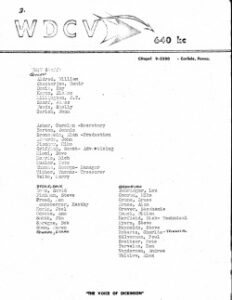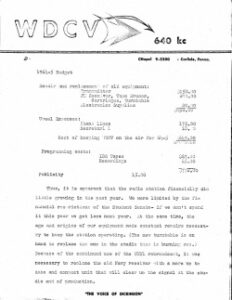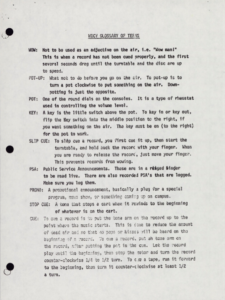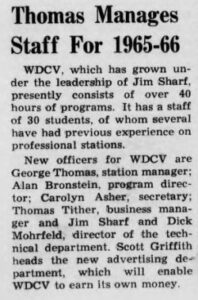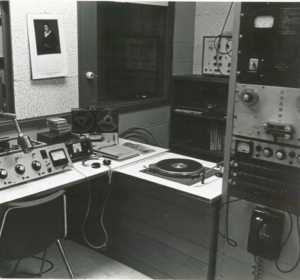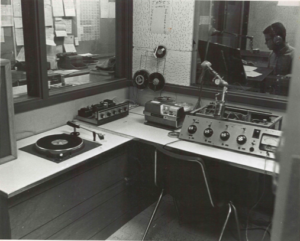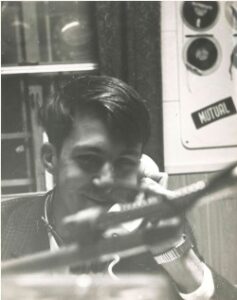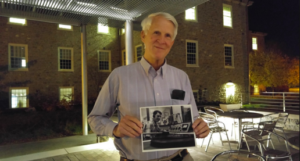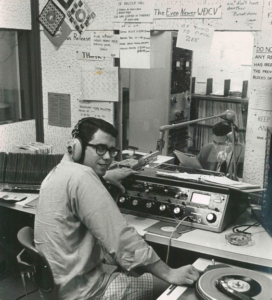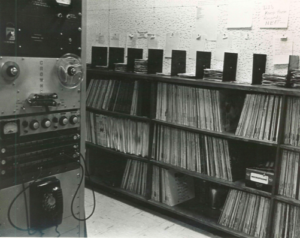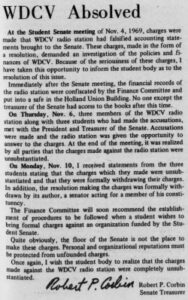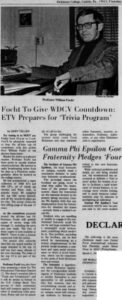A People’s History of WDCV- ’65-’69: The Early Years
Our lovely radio station was founded in 1959. The 60s, the radio’s baby years on the air, had a few hiccups with DJs being locked out and having to climb through windows to get to their show on time or the station being absolved, but we’ve persevered (Woohoo!). Our station’s original members shared their stories of dedication to the radio, where some admitted they may have become addicted to the radio (I mean, who wouldn’t be?) and others traveled to DC to report on the MLK Jr.! The “egg crate capital of the world”, as Michael Conrad ’68 calls it, holds a special place in our 60s alums’ hearts who were among the first to bring WDCV to life!
Thanks to all the alums who shared their stories!
Bernard Jay Adler ‘66, Alan Bronstein ‘66
Joel Korin ‘67
Steve Mortimer ‘68, Steve Myers ‘68, Michael Conrad ‘68, Tom Hoffman ‘68, Paul H. Silverman ‘68
Thomas Walters ‘69, Richard A. Kolb ‘69
- 1964-65 Station Update and Budget
- 1964-65 Station Update and Budget
Bernard Jay Adler ‘66
What was your involvement with WDCV?
“Played classical music and mainly read album covers relating to the composer in by best FM voice. Occasionally I would play a Broadway show album (I went on to a thirty-three year career as a Broadway production stage manager.)”
Do you have any stories, memories or secrets related to WDCV that you would like to share with us?
“The studio was lined with egg cartons. The equipment usually worked. I verified an audience of one – my girlfriend – Elizabeth Lane.”
Any parting thoughts?
“Best of luck to current and future Dickinsonians who are priviledged to intone, ‘THIS IS WDCV, THE VOICE OF DICKINSON COLLEGE IN CARLISLE, PENNSYLVANIA!’”
Alan Bronstein ‘66
What was your involvement with WDCV?
“I started in ’63. When the station moved out of Bosler(?) into the new HUB, I was elected as program mgr.”
Do you have any stories, memories or secrets related to WDCV that you would like to share with us?
“The big memory is the transition from an attic room with walls covered in cardboard egg crates to provide some sound deadening into a beautiful properly soundproofed studio with office and storage space in the lower level of the student union right by the spiral staircase.
I came to appreciate the homier, warmer feel of the attic location though. It also had a more “piraty” feel to it.
I dropped out for a semester to get my head together . . . and when I came back I had to leave WDCV out of my extra-curricular activities. Something had to go in order for me to actually graduate. I was busy enough with Mermaid Players, being photo editor of the D’sonian, and a student rep on the Omnibus D’Arts committee.
Oh, one thing that I really appreciated was learning how all those DJs in every town seem to be buddies with all those music legends. I used the recorded interviews we received on reel-to-reel tapes a lot. I’m sure you still get those (downloadable at this point in time, I’m sure), the DJ is given a script with questions and the answers are by the celeb on the sound track. We can all sound like we’re “one of the in crowd.” I’d never seen those when I was working at WPEN in Philly during high school.”
Where was the station located when you went to Dickinson?
“Bosler(?) on the SE corner of Louther and College. then it moved to the HUB by the spiral stairway.”
- November 5th, 1965- WDCV to Finish Last Minute Work
- February 19th, 1965- Thomas Manages Staff For 1965-66
Some Colleges have sold their broadcast licenses in recent years. We are grateful Dickinson still supports us and cares about College Radio. Do you think college radio is still important? Tell us why!
“1. I think that college radio stations can fill a slot not filled by commercial stations. Good examples are the stations at UPenn and Temple. Those, tho, have become less student run and more professional.
- It trains a group of caring college students in (a) how a business works, (b) how a radio station works, (c) augments a series of skills that are prized in the executive suite like thinking on your feet, controlling your voice and making it likable, ad-libbing, and presenting to a group (even if they are unseen).
- It also builds responsibility in the officers as well as the DJs . . . and further teaches the need for meeting deadlines.”
Any parting thoughts?
“I loved that part of my life and would love to do it again. Some of that rubbed off on my favorite student, who then went on to Villanova and had her own show on their radio station.”
Joel Korin ‘67
What was the name of your radio show and what time slot did it air?
“Soul Joel Show Tuesday nights 10 to midnight”
What was your involvement with WDCV?
“1963-64, At the old Music Building (now a cafe).The studio was upstairs. Egg crates served as acoustical tile. My first year Steve Fishman and I had a show together.”
Do you have any stories, memories or secrets related to WDCV that you would like to share with us?
“On the air I endorsed a fraternity brother who was running for Student Senate Office. The next morning at breakfast. WDCV was playing in the dining hall, About every 10 minutes someone from the station would come on and denounce my remarks.
On my last show, two senior women came to the studio and danced during the whole show, Someone also recorded my last show on a reel to reel tape.”
Where was the station located when you went to Dickinson?
“Freshman year, 63-64 in the Music Building. In September 64, the HUB opened and the studio moved to the basement.”
Steve Mortimer ‘68
What was the name of your radio show and what time slot did it air?
“I started in 1967 with a Friday evening slot. I played contemporary R&R and some selected oldies. I guess I called it the Steve Mortimer show for want of a more creative name. In 1968 I got one of the coveted noon time slots. The station was broadcast into the dining hall at that time… very cool”
What was your involvement with WDCV?
“Just a humble DJ”
Do you have any stories, memories or secrets related to WDCV that you would like to share with us?
“I used to insert cartoon voices that were on a tape in the middle of some songs and probably got carried away with it. Sometimes students from the college and even from town would call in and make requests for their favorite tunes. We had a news feed in on the hour and I never got the hang of cutting to it correctly. It was alot of fun and the music at the time was a mix of “soul” and the newer psychedelic stuff”
Where was the station located when you went to Dickinson?
“The station was in the Union basement where the quick stop store is now”
Some Colleges have sold their broadcast licenses in recent years. We are grateful Dickinson still supports us and cares about College Radio. Do you think college radio is still important? Tell us why!
“It’s VERY important as a connection with the larger music and cultural world”
Any parting thoughts?
“For a geeky kid like me, it was an opportunity to express myself and the music that I loved and still do.”
Steve Myers ‘68
What was your involvement with WDCV?
“’64 – ’68 DJ/news announcer
’66 – ’68 Manager – station shifted from phone line broadcast repeaters in dorms to lo-power FM”
Do you have any stories, memories or secrets related to WDCV that you would like to share with us?
“Moving the station into HUB (what a goat rope) and during slow hours (past midnight, for example) some DJ’s would dial an operator, say, in California and ‘build’ his/her program around chats with her”
Where was the station located when you went to Dickinson?
“In 1964-65, studio was in the attic of a former fraternity house behind Althouse Science Bldg. Moved to HUB in 1965”
Some Colleges have sold their broadcast licenses in recent years. We are grateful Dickinson still supports us and cares about College Radio. Do you think college radio is still important? Tell us why!
“Aside from obvious reasons, press freedom needs to be robust – an make government a bit afraid of it. Radio has both a technical and an arts face, making it fit nicely into a liberal arts college environment. Good on Dson for holding on to its call letters!”
Michael Conrad ‘68
What was the name of your radio show and what time slot did it air?
“Initially, I did a show called “The Jazz Sound” for a couple hours on Friday nights. When the station moved into new facilities next to the student store in the HUB I continued playing “middle of the road” music several times a week. Eventually, during my last year and a half, the station went to a complete top 40 format and I became a “rock jock.” This last experience served me well as I went on to other radio stations.”
What was your involvement with WDCV?
“To my detriment, I got involved with the station shortly after arriving on campus in 1964. From late 1966 through graduation in 1968, I was chief engineer and jocked throughout the week. As if that wasn’t enough, I also did play by play for Dickinson Basketball home and away games. My association with the station became so extensive that it impacted my academics and I nearly flunked out.”
Do you have any stories, memories or secrets related to WDCV that you would like to share with us?
“During my four years at Dickinson, DCV was a “carrier current” operation. That meant that an AM signal was fed into the electric cirsuitry in the dorms. The signal was supposed to be confined to each building. IT WASN’T! When all the dorms were wired up, our signal was so strong that it could be heard all over town. We didn’t care. It actually got to the point where stores were playing us in both malls. We loved it. Ultimately, this gross over-extension of our signal led to the station being sited by the FCC and shut down in 1969.”
Where was the station located when you went to Dickinson?
“Initially, the studios (or should I say studio) nicknamed the “egg crate capital of the world” were located on the top floor of a small home behind Althouse. “Egg crate” because acoustics were controlled by egg cartons glued to the walls.In 1965, the station re-located to a four room complex next to the student store in the HUB.”
Some Colleges have sold their broadcast licenses in recent years. We are grateful Dickinson still supports us and cares about College Radio. Do you think college radio is still important? Tell us why!
“For me, college radio was extremely important as a platform from which I was able to learn enough about broadcasting to launch a part-time career which I still pursue to this day.”
Any parting thoughts?
“BE CAREFUL! Radio is addictive. If you are not cautious, it can sink your academics which is the real reason that you (your parents) are paying all that money to be a Dickinson student.
Have fun!!”
Tom Hoffman ‘68
Do you have any stories, memories or secrets related to WDCV that you would like to share with us?
“My first slot was on Sunday mornings. Someone was supposed to unlock the building so I could get in. If they didn’t do that, you had to climb up on the roof and get into the “studio” through an unlocked window. That got trickier in the winter.”
Some Colleges have sold their broadcast licenses in recent years. We are grateful Dickinson still supports us and cares about College Radio. Do you think college radio is still important? Tell us why!
“Well, it was important to me. In fact, in was indirectly responsible for my career in the energy industry.”
Paul H. Silverman ‘68
Do you have any stories, memories or secrets related to WDCV that you would like to share with us?
“1. In the beginning we broadcast from the second floor of the old music house. It was in the shape of a castle turret, low ceiling, tight fit, one room, called the “Egg crate capitol” of D’son because the ceiling and walls were covered with throw away egg-crates that were our version of sound baffles to quiet the room. It was a one man operation. The DJ did the sound check, Qued the record, and worked the per-recorded adverts and public announcement. That was pioneering. When we move to the newly built Holland Union, ground level, it was a new era. The DJ and the sound technician in two rooms with glass partition.
- I was personally at and reported on the wake of Martin Luther King in Moorehouse College, Atlanta GA as well as the day of and after the shooting.
- I interviewed David Susskind, Peter Jennings, Newton Minow, and Dick Gregory each a speaker at D’son invited by me as Chair of D’son speakers committee.”
Where was the station located when you went to Dickinson?
“The second floor of the music building which just a bare stone faced house with a second floor in the shape of a round turret. When completed, moved to lower level Holland Union which was considered spacious and state of the art audo broadcasting for our size college.”
Any parting thoughts?
“My radio show certainly was a plus to my personal growth. The show called upon me to take responsibility for every word I spoke, to control my time, to enlarge my vocabulary, to learn how to project my voice, to work with others.”
Thomas Walters ‘69
What was the name of your radio show and what time slot did it air?
“I held many slots over my four years. As program director if somebody couldn’t do their show I had to either find a replacement or do the show myself. My favorite time was 8PM to 10PM however.”
What was your involvement with WDCV?
“Disc Jockey 1965-66
Executive Board 1966-69
Program Director part of 1966-67
Program Director 1967-68
Program Director 1968-69”
Do you have any stories, memories or secrets related to WDCV that you would like to share with us?
“The 1969 Micrcosm suggests that I graduated with a degree in economics, but in reality I spent more time at WDCV in my four years than I did with my major, so I always felt that I majored in radio and minored in economics. I did go on to law school and have been practicing law for about forty years now, but my experience in managing the radio station in those years was an invaluable experiece that I could never duplicate. The years 1965-69 were an incredible time to be a college student and had to be four of the most turbulent years for our nation and it was equally significant for the growth of the radio station. Prior to 1966 it was difficult to muster enough people to participate in the station but by 1969 there were was a waiting list. This was in large part due to the relocation to the HUB coupled with a group of students who truly wanted to see the radio station become a successful part of the campus community. During that period we added hourly newscasts with both national and local news, added “wire services” for more news, started broadcasting home and away games for both football and basketball, and added a “record” subscription service from the major record companies for promoting all of the popular music. We patterned our operation after other “Top 40” radio stations from Philadelphia and New York that were popular at the time and later added “progressive rock” shows as musical tastes changed. I’ve got alot of memories about my involvement at the station including the death of MLK, the allnight broadcast of the 1968 elections, and some of our failed attempts to cover live student demonstrations and some sporting events but this may be more information than you really need. Thanks for reaching out to me on this and if I can be of any help let me know.”
Where was the station located when you went to Dickinson?
“The station moved to the HUB in early 1966. Prior to that it was located across the street in the old religion building.”
Richard A. Kolb ‘69
What was the name of your radio show and what time slot did it air?
“Started out on Sat nights with “Easy Lsitening” but later the station went to Top 40 format – did several shows a week at different times”
What was your involvement with WDCV?
“DJ at first, then News Director and finally Station Manager in 1968-69. Also did Basketball play-by-play for a time”
Do you have any stories, memories or secrets related to WDCV that you would like to share with us?
“Probably the most memorable events occurred in 1968 – the assassination of Martin Luther King, Jr. and the Presidential election that year. We did all night coverage of election results with the aid of UPI service (now long defunct). My most interesting experience personally was a trip made to Washington DC after the King assassination when there were riots in the Nation’s Capital. I went with Scott Geare, who was then News Director, and we managed to get into the city despite a military quarantine and were even able to attend a press conference held by Cyrus Vance who was appointed by the White House to oversee the restoration of peace and reforms after the assassination. Quite a time when the city was essentially under marshal law.”
Where was the station located when you went to Dickinson?
“In the basement of the HUB – there were 2 small studios and a work area. One was used for AM broadcasts and the other for the very beginnings of an FM station.”
Some Colleges have sold their broadcast licenses in recent years. We are grateful Dickinson still supports us and cares about College Radio. Do you think college radio is still important? Tell us why!
“It is a great outlet for learning about the broadcast/media industry. It also provides a source of entertainment for the college community and, I presume, beyond Dickinson itself.”
Do you have any WDCV memorabilia hidden away that you might want to share with us? Please tell us what you think you may have and we will find a way to get a copy to us.
“I have old tapes (cassettes) of our trip to Washington, DC and the broadcast we did of the King memorial held at the college.”


